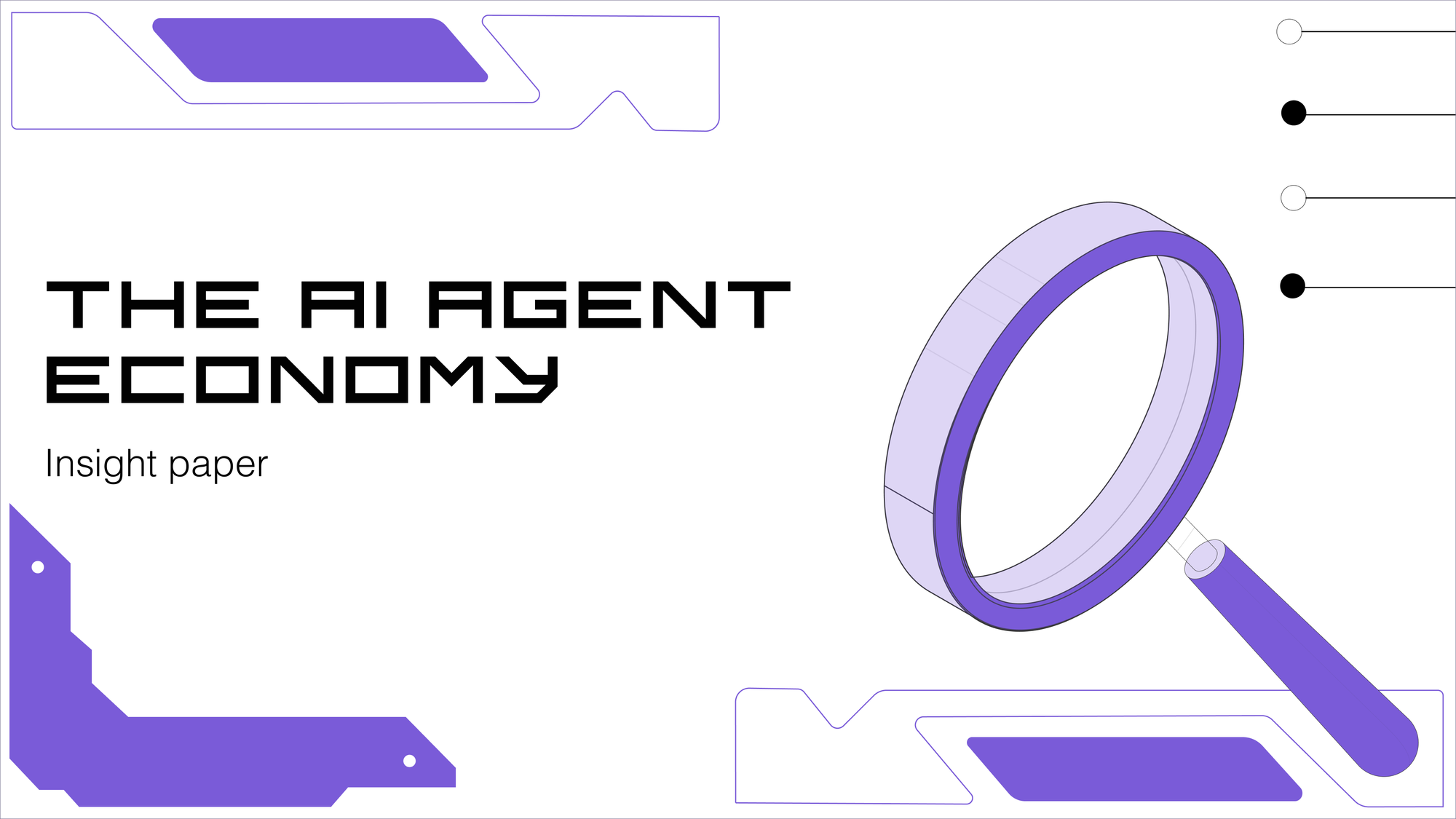AI Agent Economy

In the rapidly evolving landscape of decentralized finance, AI agents are poised to not just assist us with tasks but to actively participate and even lead in the creation of nation-states on the blockchain. These sophisticated chatbot-like interfaces will drive user adoption and dominate the volume of on-chain transactions, surpassing human interactions. This revolutionary shift in user experience and new products will fundamentally redefine our understanding of programmatic economic systems and governance structures.
What is an AI Agent?
An AI agent is a piece of software designed to execute tasks on behalf of a user, operating autonomously as its own entity. Its actions are driven by machine learning models or datasets provided by a team or protocol, training the AI agent's behavior for specific tasks. In the context of Omo, AI agents will leverage on-chain data to create and use machine-learning models tailored for broad spectrum of use cases. In the context of DeFi, these AI agents will use these models for inference, executing yield strategies for end users. The goal is to optimize for both Annual Percentage Rate (APR) and security simultaneously.
UX Issues
Interacting on-chain can be cumbersome, as seen with many current products. Unibot pioneered the Telegram bot niche, and this trend has propagated significantly with applications like Bonkbot, BananaGun, Moonshot, and soon Shogun.fi, serving as onboarding tools for new participants within the meme ecosystem.
The key takeaway here is that abstracting away the on-chain UX is the core value proposition that has onboarded and converted new users on-chain. AI agents can facilitate this on an exponential scale. While trading memes on Telegram bots is entertaining to indulge the “animal spirits” per say. It’s a common thesis operators which is, many users will interact with complex products within the market after being on boarded through memes. Saneel from Ritual.net anticipates that “agents will contribute more transactions than humans on-chain within two years.” At the pace this agent space is evolving it will be far sooner then we expect.
For the end-user, this means no more clicking 10-20 times to execute a complicated DeFi product to . Over time, users will have AI agents as digital companions, similar to RabbitX as a hardware device but in software form. These agents will serve as gateways to the entire on-chain economy, increasing the adoption of self-custody for finances and data without the associated responsibilities.
Adoption of Network States
Before discussing how AI agents will accelerate the growth of network states, let's first define one.
A network state is a new form of social and political organization enabled by digital technology. Unlike traditional nation-states, network states are not confined by geographical boundaries. They are formed and connected through shared values, interests, or goals, facilitated by the internet and blockchain technology. It's an early but clear trend that generalized execution layers like Ethereum, Solana, and, more recently, Bitcoin (with ordinals and runes) are productive economies beginning to impact both culture and the global economy.
As AI agents take on a larger role in the volume and transactions on these networks, this will bolster the network effects of these “network states.” Autonomous actors using off-chain ML models for on-chain behavior will significantly impact these ecosystems.
As network states grow, with both AI agents and users transacting on-chain, AI agents will not only play a crucial role in increasing notional value/volume they bring to the system but also participate in on-chain governance on behalf of users. This future is exciting to conceptualize because AI agents will act as credibly neutral “software citizens” participating in the broader global economy based on user prompts and intents from a simplified interface.
DAOs & ML Models
"Whoever controls the model controls the world." Within Omo, ML models will be built around a variety of consumer use cases. The fOMO DAO will have significant responsibilities, including the governance and oversight of Omo’s generalized ML model.
Omo will accrue valuable data on user preferences, such as which vaults they favor, which networks they prefer, and their chosen strategies and niches. While this might initially seem like surveillance, we intend to use this data to empower our community. Granting token holders the ability to define the parameters of the generalized ML model, is crucial for the creation and risk management of vault strategies.
By involving our most loyal and largest depositors in these decisions, we aim to maintain and strengthen these important relationships. Governance rights to influence these parameters will be granted to members of the fOMO DAO, ensuring that our community has a direct say in shaping the protocol's future.
Move VM & Optimistic Parallelization
How does this tie back to AI, you may ask? Blockchains inherently become more efficient with an optimistic parallelization design schema, which is currently being adopted by many blockchains. AI agents will also prefer to transact on more secure virtual machines. Move-VM, with its built-in formal verification, serves as a barrier to prevent common hacks like re-entrancy from occurring.
Similar to other EVMs & Move-VMs coming to market soon that allow for optimistic parallelization. This makes the virtual machine multi-threaded, allowing for more throughput on the blockchain, provided transactions don’t affect the state of the same storage slots within the VM. For example, parallelization cannot occur if multiple agents want to buy the same NFT collection, then a single-threaded approach will be performed.
This overall design will allow for the exponential growth of AI agent economies on both Move-based and multi-threaded VMs. AI agents interacting with enterprise-grade data or executing financial transactions will likely prefer Move-VM as these applications and teams migrate over, benefiting from its advanced security and efficiency features.
Conclusion
The AI Agent Economy represents a paradigm shift in how we interact with blockchain technology and decentralized finance. By integrating AI agents into the fabric of network states and leveraging community-driven ML models, Omo is also building along side others in this revolution. As we navigate this new frontier, the fusion of AI and blockchain will redefine economic systems, governance, user engagement, how we interact with one another, and so much more.
We are only scratching the surface.

